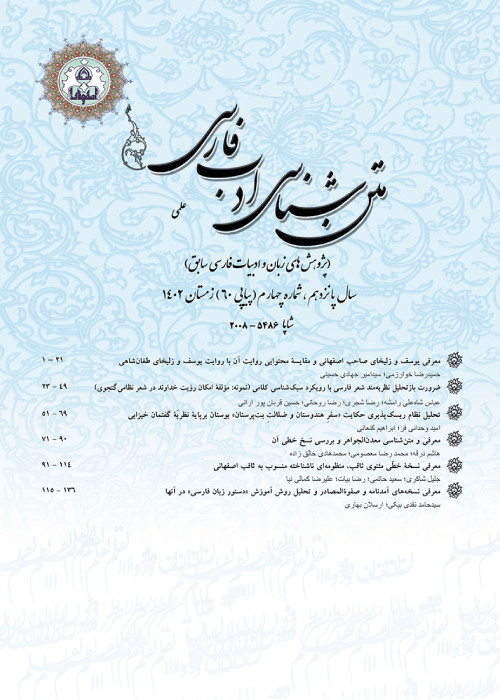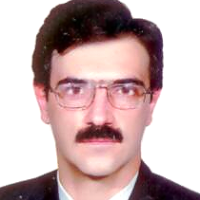Analysis of the Correction of Nuzhat Al-Oghul Fi Latifa Al-Fosol of Abu Tahir Muhammad Bin Muhammad Yahya Aufi
The present research investigated the corrective damages of the text of Nuzhat Al-Oghul Fi Latifa Al-Fosol and presented various evidence and examples to prove this issue. Nuzhat Al-Oghul Fi Latifa Al-Fosol is written in prose on the subject of Islamic ethics and mysticism, by Abu Tahir Muhammad Bin Muhammad Yahya Aufi. This one-copy text has been corrected by Iraj Afshar and Javad Bashari. The basis of this research was a comparative critique of the work corrected with the original version, and similar examples of ancient texts have been mentioned in some cases to confirm and complete the correction of defective samples. Although the text is a single copy, and the editors have considered the texts’ margin effect as a copy, there are several correctional damages that the authors of the present study have to investigate. These damages are classified into several headings titles, including ignorance of the original version, ignorance of the metre of the verses, false meaning of verses, text extensions, text shortcomings, ignorance of the sentence structure, and such examples that have been obtained by matching the text of the book with the original version. Moreover, only the obvious errors of the work were examined to avoid the prosaic prolixity.
Nuzhat Al-Oghul Fi Latifa Al-Fosol is a single copy text (with serial No. 9084, Ayatollah Marashi Library) by an author named Abu Tahir Muhammad Bin Muhammad Yahya Aufi. Iraj Afshar says, "It is an unknown text" and has corrected it (see Afshar, 2011, p. 13). Little is known about the owner of Nuzhat. There is also doubt about the correctness of the author of the book. At the beginning of the book, some have called him "Al-Oumi" due to the author's name being distorted in the version (see Version: 1a). Afshar has corrected it as "al-Aufi" since the author of the Nuzhat Al-Oghul says about his uncle "Abd al-Rahman Auf" (see: Afshar, 2011, p. 167; manuscript: p. 110a).
The data collection method in the present research is the library and tacking note. In this research, the printed text of the book Nuzhat Al-Oghul Fi Latifa Al-Fosol was compared with the original version by the analytical-comparative method. Corrections in this text have been cited by matching the printed version and text to prove a more societal example of ancient texts in some cases.
This research has addressed the corrective damages in the following categories:Grammatical Errors: the ignorance of the grammar in some cases has caused corrective (criticism) damages. A sentence is presented in a position of the text, which is not grammatically correct. In Afshar's correction, it is stated, "Let each of us speak the truth, so that there was no wrong in it, which, by its blessings, will free us from this prison" (Afshar, 2011, p. 187). The verb "not being" is mentioned in the version, and the sentence ends with the same verb (see 120a). In the following, "be that" is the beginning of the following sentence, and that "be that" means hope that has been used, "Let each one speak the truth, as there is nothing wrong with it. May it really free us from this prison with its blessings" (Version: 120a). Damages of Pun and Saj: Due to the calligraphy of the version of Nuzhat Al-Oghul and continuity of words in prepositions, plural signs, compound words, and similar examples, pun and saj in this work need serious revision. Failure to pay attention to the connection of words with these devices destroys the artistic beauties of the work, mainly that they have been acquired by ancient calligraphy (see Jalali & Forouzandehfard, 2018, p. 108). In an example of Afshar's correction, it is stated, "He did not extend his hand and finger towards the bread" (Afshar, 2011, p. 106). In the version, "hand and finger did not extend towards the bread" is mentioned (Version: 71a). It is clear that the author's construction was creating punctuation between the two words of finger and towards the bread. The neglect of this critical matter has destroyed it in correction. Lack of attention to the metre in the poems: Persian metres are one of the things that the critic and the corrector can comment on decisively. Ignoring this vital point is sometimes misdiagnosed. In some parts of the text, the wrong correction has disturbed the verse’s metre and meaning (Afshar, 2011, pp. 44 and 175). Additionally, items such as text deficiencies, text redundancies, serious spelling mistakes that had a significant effect on correction, as well as grammatical errors, were examined. Examples of these damages were provided during the research. The most important achievement of this research is to prove the revision of the correction of the text of Nuzhat Al-Oghul Fi Latifa Al-Fosol.
- حق عضویت دریافتی صرف حمایت از نشریات عضو و نگهداری، تکمیل و توسعه مگیران میشود.
- پرداخت حق اشتراک و دانلود مقالات اجازه بازنشر آن در سایر رسانههای چاپی و دیجیتال را به کاربر نمیدهد.





